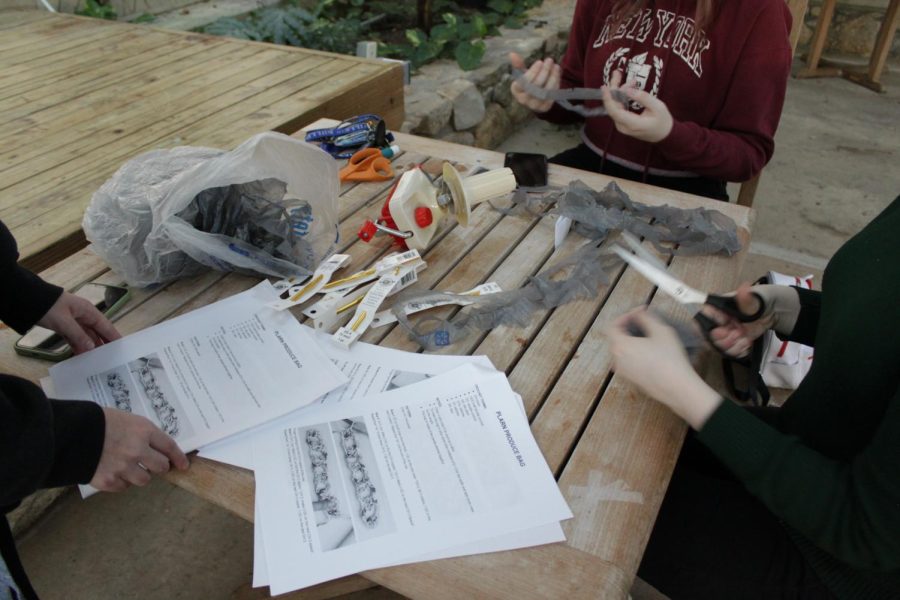UNCA embraces sustainability on campus
Students working on making the reusable bags inside of the UNCA glasshouse.
March 30, 2022
Having previously signed a commitment to carbon neutrality, and offering several on-campus gardens and various sustainability programs, UNC Asheville holds a wide range of activities for students interested in being involved in saving the environment.
“Currently, I am the president of Knitting For the Needy on campus and we are beginning a project to support sustainable choices,” said Theadora Welland, sophomore and president of Knitting for the Needy. “We are upcycling disposable grocery bags into reusable shopping totes and produce bags.”
Recycling impacts the UNCA campus and remains one of the many ways the school helps the environment through energy efficiency.
Stephanie Wiener, a senior, said recycling bins on campus are frequently picked up, but remains unsure where they get taken off to.
“It goes to a black hole behind Highsmith Student Union,” Wiener said. “I hear the dumpster get picked up every night from my apartment at 4 a.m.”
UNCA takes part in many groups and programs that strive to keep the campus alive and the earth healthy.
Sarah Branagan, senior and environmental studies major, said they know Asheville remains deeply committed to sustainability.
“The campus itself is a Tree Campus and a Bee Campus, meaning that we are providing valuable habitat for wildlife and pollinators,” Branagan said. “We have three student-run gardens that produce seasonal vegetables, herbs and mushrooms that are used on campus and for education.”
The campus itself keeps getting many updates to make a more eco-friendly environment by adding student-led gardens, electric vehicle parking spaces and providing things to improve overall plant life and water in the area, as UNCA sits near the French Broad River.
“Scattered around the campus, we have stormwater retention ponds to improve the quality of the water before it enters our rivers,” Branagan said.
Energy efficiency, another big part of sustainability, is seen throughout UNCA residence halls, through signs on doors and mirrors that give tips on how to preserve energy.
“Many of our buildings are certified through LEED,” Branagan said. “Others have solar power, green roofs, or ground-source heat pumps to lessen our energy consumption.”
UNCA follows the guidelines set by the Leadership in Energy and Environmental Design and has buildings with varying degrees of certification levels. On top of having energy-efficient classrooms and buildings, UNCA offers classes centered around different environmental projects and offers various clubs, jobs and volunteering opportunities centered around sustainability.
“Above all, UNCA is one of the few universities to commit to carbon neutrality by 2050. I am very impressed with what UNCA has done to demonstrate their commitment to sustainability on campus,” Branagan said. “I also love that, as a student, you can get involved in one of our many active environmental organizations to really make a difference in your community.”
The UNCA Office of Sustainability not only acts as the student hub for involvement and interaction for a healthy earth, but also provides learning and experience opportunities to help with sustainable campus practices.
More information can be found about the Office of Sustainability under the sustainability tab on the UNCA webpage.
“When I have approached the Office of Sustainability with an idea, they have been very supportive in helping me achieve that goal. I am proud that our campus not only vocalizes their commitment to sustainability, but lives it as well,” Branagan said.
Despite UNCA’s push toward sustainability, some students said there are still ways UNCA can improve the campus environment and be more sustainable. Some suggestions made include adding more trash cans and recyclable utensils, changes to energy-producing lights and outlets and cleaning up trash. Wiener said there should be motion sensor lights in dorm rooms.
“I think placing a compost bin in student rooms will support sustainability,” Welland said.
Compost bins will help students be able to put degradable materials into the earth and cause less pollution.
Ideas of improvement from students like Brangan, Wiener, Welland and others can help shape the future of UNCA sustainability on campus.
“My only recommendation for the future of UNC Asheville is a continued commitment to what is already being done. As we begin to better understand what we can do for the environment on a university level, I hope they continue to empower the ideas of their students and grow sustainably into the future,” Branagan said.


















